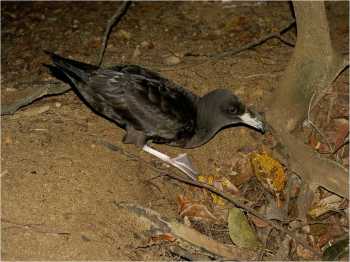Jen Lavers (Institute for Marine and Antarctic Studies, University of Tasmania, Sandy Bay, Australia) and Alex Bond have published early view in the journal Marine Environmental Research on plastic pollution in Flesh-footed Shearwaters Puffinus (Ardenna) carneipes
The paper’s abstract follows:
The ingestion of plastic by seabirds has been used as an indicator of population and ocean health. However, few studies have examined adults and juveniles of the same species concurrent with the availability of plastic in the local marine environment. In King George Sound (KGS), Western Australia, 13% of adult flesh-footed shearwaters (Ardenna carneipes) and 90% of fledglings contained plastic items in their digestive tract. On Lord Howe Island (LHI), New South Wales, 75% of adult shearwaters and 100% of fledglings contained plastic.
Ingested items were assessed using Jaccard’s Index (whereJ= 0 indicates complete dissimilarity andJ= 1 complete similarity). The colour of items ingested by self- and chick-provisioning shearwaters from KGS exhibited broad overlap with plastic available in the local environment (J= 0.78-0.80), and plastic in adults and fledglings from LHI were less similar to those available (J= 0.31-0.58). Additional data on seabird colour selection would improve our understanding of the factors influencing the behaviour of ingesting plastic, and its contribution to the decline of some species.

Flesh-footed Shearwater, photograph by Barry Baker
Reference:
Lavers. J.L. & Bond, A.L. 2015. Selectivity of flesh-footed shearwaters for plastic colour: evidence for differential provisioning in adults and fledglings. Marine Environmental Research doi:10.1016/j.marenvres.2015.10.011.
John Cooper, ACAP Information Officer, 10 November 2015

 English
English  Français
Français  Español
Español